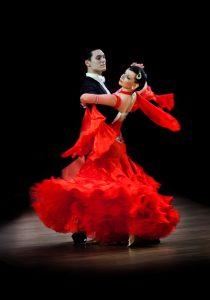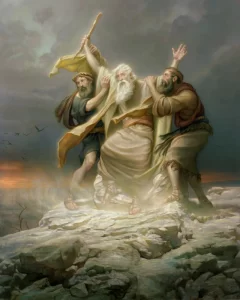Words on the Word
29 Sunday C
Exodus 17.8-13: But Moses’s arms grew heavy.
2 Timothy 3.14-4.2: Be urgent in season and out of season.
Luke 18.1-8: The need to pray continually and never lose heart.
In our second reading Paul exhorts Timothy to ‘be urgent in season and out of season’. Timothy, who was bishop of Ephesus, was to ‘convince, rebuke, and exhort, unfailing in patience and in teaching’, ever ready, ever armed, like a soldier for battle, to fight for the good. In the Gospel Jesus tells the story of the persistent, bothersome widow who nags day and night so that a cynical bureaucrat lets her have her will for his own convenience’s sake. The point of the parable is to show that we must ceaselessly pray. Never must we grow tired. ‘My Father is still at work’, says Jesus after healing the man who for 38 years had been lying by the Sheep Gate in Jerusalem: ‘My Father is still at work. I, too, work’ (John 5.17).
When our God, the King of the Universe, is ceaselessly working, then we, too, his creatures and servants, must surely do likewise?
Well, that’s a thought. But how tired we often are, how worn out! We live in an exhausting time. A record number of people hit the wall, burn out. We often hear ourselves and others say, ‘I’m so exhausted’. So ingrained is the habit that if someone doesn’t profess, within a few minutes of a conversation starting, to exhaustion, people are likely to think, ‘He must be a right layabout!’
What tires us so? Society moves at a terrific speed. The gadgets we carry beep, chirp, and vibrate day and night: there’s constantly something going on! We do not want to miss out. We wish to show ourselves engaged, hard-working. But do we have to live like this?
Not necessarily.
A few years ago a friend of mine started a career in finance in London. In the office people were working 12, 13, 14-hour days. He did as much for a while, then asked himself: ‘What for?’ There must be more to life. He made a decision. Short of a crisis, he started leaving work at 6. He went to dance lessons. Ballroom dancing! That’s what he wanted. There were a few raised eyebrows in the office, but not only did he not lose his job: he became more productive.
 Perseverance presupposes balance. Work presupposes rest. Our God, ‘still at work’, rested on the seventh day and bade us, bids us, keep the Sabbath holy (Exodus 20.8). O blessed commandment! It lets us catch our breath. More essentially, it relativises the importance of productivity. Too easily we make of the work of our hands, or of work itself, an idol. Rest frees us from this trap. It permits us to drop our shoulders and to look up.
Perseverance presupposes balance. Work presupposes rest. Our God, ‘still at work’, rested on the seventh day and bade us, bids us, keep the Sabbath holy (Exodus 20.8). O blessed commandment! It lets us catch our breath. More essentially, it relativises the importance of productivity. Too easily we make of the work of our hands, or of work itself, an idol. Rest frees us from this trap. It permits us to drop our shoulders and to look up.
Somehow our work must be imbued with rest. It takes a while to learn this, but it can be done. It is the way to stop being a faceless cog in a machinery and to become instead a conscious, free agent.
The widow in the Gospel is a worker. Her campaign is also an example of prayer. Prayer, too, is a mixture of effort and rest. The Lord shows us both. In the wilderness, tempted by Satan, he led a fierce battle. When his disciples found him in prayer at daybreak, he was in peaceful communion with his Heavenly Father. Prayer in the life of a Christian must become like respiration. It is obvious that we cannot always hyperventilate. So by all means, pray always. But remain at rest, grounded in God’s peace, which the world cannot give.
Our first reading speaks of Israel’s battle against Amalek. The Amalekites were descendants of Esau, a people that did not wish to let Jacob’s sons complete their journey, which God had ordained, from Egypt to Canaan. The historical conflict was real. Further, the Amalekites acquired symbolic significance. ‘To fight the Amalekites’ means to fight all that in us and about us that hinders our essential progress, keeping us from reaching the goal to which God calls us.
Moses, the people’s teacher and interpreter before God, watches over the battle his hands raised in blessing. He must ‘be urgent in season and out of season’, an image of devout attention. However, no one can stay standing like that, with hands up in the air, indefinitely. Remember: Moses was already an old man.
The image Scripture then puts before us is wonderful:
they took a stone and put it under him, and he sat upon it, and Aaron and Hur held up his hands, one on one side, and the other on the other side; so his hands were steady until the going down of the sun.
In just this way we are called to support each other. A believer is not abandoned to his or her own limited resources. A believer is borne by God’s ‘everlasting arms’, of course; but also by the people of God, which for us Christians is to say, by the Church. 
Thank God we are not all fragile at once. We can be a staff to one another. When I stumble, I hope you will give me a hand. Should you stumble, I’ll step in. We must look out for one another with alertness and care. It is comforting to live like this. It can also be demanding. It requires us to let go of a sense of self-sufficiency, an illusion to which we cling absurdly.
From the beginning, God has been pleased to realise his purpose in this world not through individual contracts, but by making a covenant with a people. The people is called to move as one, as a body. Being members of that body (1 Corinthians 12.12-27), we are caught up in a rhythm in which continuous movement is allied to unshakeable peace. This is the mystery of the Church, put before us in the image of Moses flanked by Aaron and Hur, one on his left side, the other on his right.
Let’s strive to live up to that image in our community here. If we do, the Lord will find faith on earth when he comes. And fidelity.
In the name of Christ! Amen.
